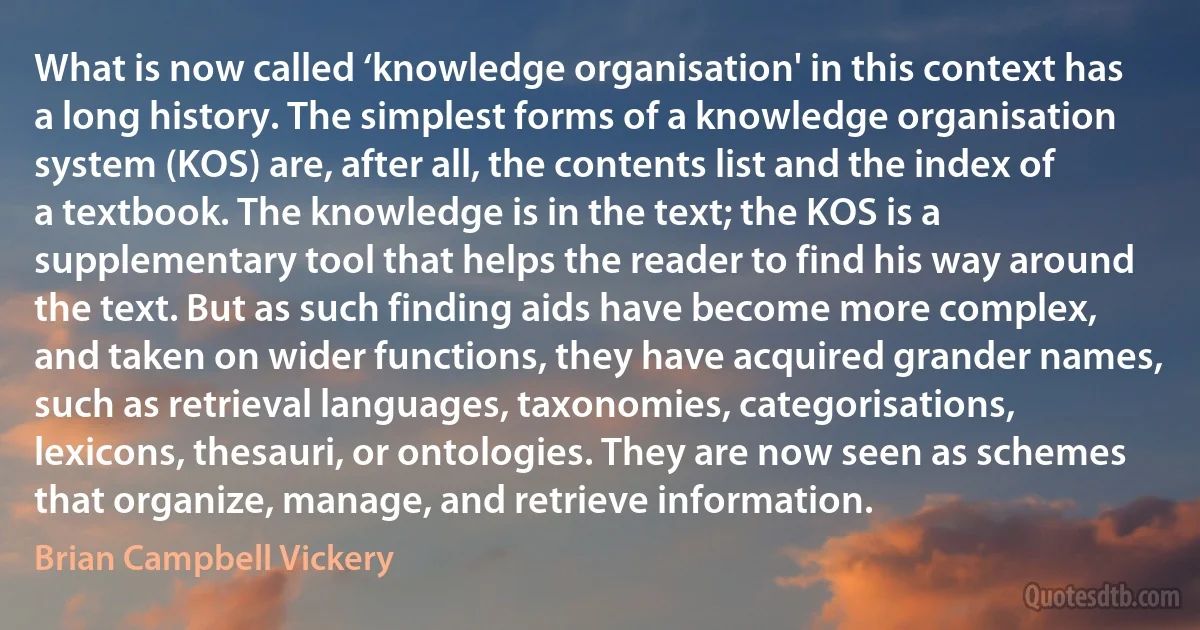
What is now called ‘knowledge organisation' in this context has a long history. The simplest forms of a knowledge organisation system (KOS) are, after all, the contents list and the index of a textbook. The knowledge is in the text; the KOS is a supplementary tool that helps the reader to find his way around the text. But as such finding aids have become more complex, and taken on wider functions, they have acquired grander names, such as retrieval languages, taxonomies, categorisations, lexicons, thesauri, or ontologies. They are now seen as schemes that organize, manage, and retrieve information.
Brian Campbell VickeryRelated topics
complex context find history knowledge now retrieval retrieve seen supplementary take text way organisation textbook namesRelated quotes
Every Christian should find for himself the imperative and incentive to become holy. If you live without struggle and without hope of becoming holy, then you are Christians only in name and not in essence. But without holiness, no one shall see the Lord, that is to say they will not attain eternal blessedness. It is a trustworthy saying that Jesus Christ came into the world to save sinners (I Tim. 1:15). But we deceive ourselves if we think that we are saved while remaining sinners. Christ saves those sinners by giving them the means to become saints.

Philaret Drozdov
Hayek's reasons for holding that planning cannot work are not limited to the problem that the information required for the task of coordinating the plans of a multitude of individuals is too vast to organize effectively. The knowledge utilized within the market by entrepreneurs does not exist outside that local context and thus cannot even be organized in principle. It is not that planners would face a complex computational task; it is that they face an impossible task, because the knowledge required is not accessible to them no matter what technological developments may come along to ease the computational burden.

Friedrich Hayek
The point of one of [Rawls'] main constructions-the introduction of the "veil of ignorance”-is precisely to exclude from consideration empirical information that might prejudice the overriding normative force of the outcome. It is, then, extremely striking, not to say astounding, to the lay reader that the complex theoretical apparatus of Theory of Justice, operating through over 500 pages of densely argued text, eventuates in a constitutional structure that is a virtual replica (with some extremely minor deviations) of the arrangements that exist in the United States.

Raymond Geuss
The central psychological endeavor of Kierkegaard may be summed up under the heading of the question he pursued relentlessly: How can one become an individual? The individual was being swallowed up on the rational side by Hegel's vast logical "absolute Whole," on the economic side by the increasing objectification of the person, and on the moral and spiritual side by the soft and vapid religion of his day. Europe was ill, and was to become more so, not because knowledge or techniques were lacking but because of the want of passion, commitment. ""Away from Speculation, away from the System," he called, and "back to reality!"

Rollo May
We find that the manager, particularly at senior levels, is overburdened with work. With the increasing complexity of modern organizations and their problems, he is destined to become more so. He is driven to brevity, fragmentation, and superficiality in his tasks, yet he cannot easily delegate them because of the nature of his information. And he can do little to increase his available time or significantly enhance his power to manage. Furthermore, he is driven to focus on that which is current and tangible in his work, even though the complex problems facing many organizations call for reflection and a far-sighted perspective.

Henry Mintzberg
